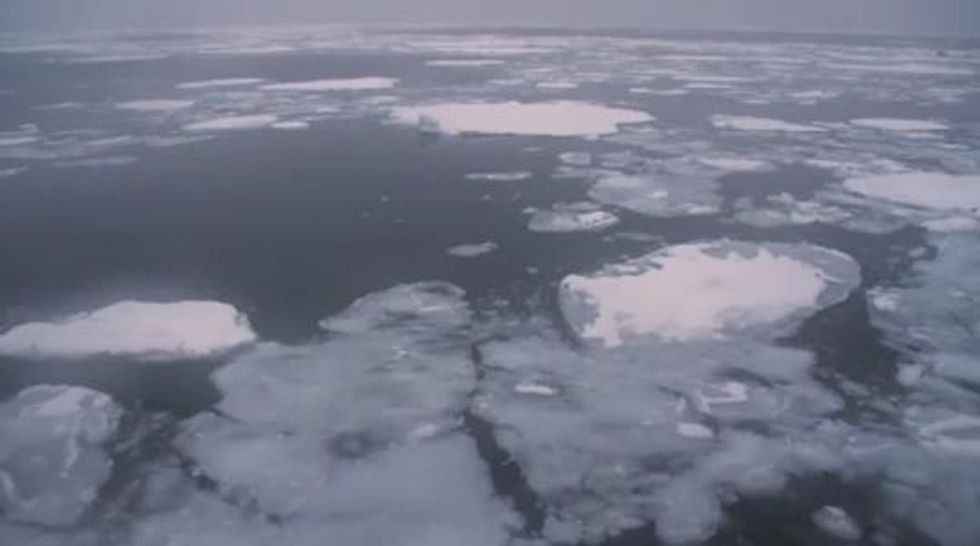

SUBSCRIBE TO OUR FREE NEWSLETTER
Daily news & progressive opinion—funded by the people, not the corporations—delivered straight to your inbox.
5
#000000
#FFFFFF
To donate by check, phone, or other method, see our More Ways to Give page.


Daily news & progressive opinion—funded by the people, not the corporations—delivered straight to your inbox.

The rapidly acidifying Arctic Ocean caused by absorbing the world's CO2 emissions have pushed us beyond "critical thresholds," with widespread impacts to be felt for "tens of thousands of years" even if we stopped emissions, say scientists.
The three-year assessment from a team of international scientists is being released at the Arctic Monitoring and Assessment Programme's (AMAP) International Conference on Arctic Ocean Acidification starting Monday in Bergen, Norway, and details how the phenomenon dubbed "climate change's evil twin" is causing a global problem.
"Continued rapid change is a certainty," Bellerby told BBC News.
"We have already passed critical thresholds," warned Bellerby. "Even if we stop emissions now, acidification will last tens of thousands of years. It is a very big experiment."
Sam Dupont, Researcher at the University of Gothenburg, says that "something really unique is happening. This is the first time that we as humans are changing the whole planet; we are actually acidifying the whole ocean today."
"The most optimistic prediction," Dupont says, "tells us that within few decades, by the end of this century, the ocean will be two times more acidic. And we also know that it might be even faster in the Arctic."
The impacts of this acidification will be widespread, as Dupont explains.
Dear Common Dreams reader, The U.S. is on a fast track to authoritarianism like nothing I've ever seen. Meanwhile, corporate news outlets are utterly capitulating to Trump, twisting their coverage to avoid drawing his ire while lining up to stuff cash in his pockets. That's why I believe that Common Dreams is doing the best and most consequential reporting that we've ever done. Our small but mighty team is a progressive reporting powerhouse, covering the news every day that the corporate media never will. Our mission has always been simple: To inform. To inspire. And to ignite change for the common good. Now here's the key piece that I want all our readers to understand: None of this would be possible without your financial support. That's not just some fundraising cliche. It's the absolute and literal truth. We don't accept corporate advertising and never will. We don't have a paywall because we don't think people should be blocked from critical news based on their ability to pay. Everything we do is funded by the donations of readers like you. Will you donate now to help power the nonprofit, independent reporting of Common Dreams? Thank you for being a vital member of our community. Together, we can keep independent journalism alive when it’s needed most. - Craig Brown, Co-founder |

The rapidly acidifying Arctic Ocean caused by absorbing the world's CO2 emissions have pushed us beyond "critical thresholds," with widespread impacts to be felt for "tens of thousands of years" even if we stopped emissions, say scientists.
The three-year assessment from a team of international scientists is being released at the Arctic Monitoring and Assessment Programme's (AMAP) International Conference on Arctic Ocean Acidification starting Monday in Bergen, Norway, and details how the phenomenon dubbed "climate change's evil twin" is causing a global problem.
"Continued rapid change is a certainty," Bellerby told BBC News.
"We have already passed critical thresholds," warned Bellerby. "Even if we stop emissions now, acidification will last tens of thousands of years. It is a very big experiment."
Sam Dupont, Researcher at the University of Gothenburg, says that "something really unique is happening. This is the first time that we as humans are changing the whole planet; we are actually acidifying the whole ocean today."
"The most optimistic prediction," Dupont says, "tells us that within few decades, by the end of this century, the ocean will be two times more acidic. And we also know that it might be even faster in the Arctic."
The impacts of this acidification will be widespread, as Dupont explains.

The rapidly acidifying Arctic Ocean caused by absorbing the world's CO2 emissions have pushed us beyond "critical thresholds," with widespread impacts to be felt for "tens of thousands of years" even if we stopped emissions, say scientists.
The three-year assessment from a team of international scientists is being released at the Arctic Monitoring and Assessment Programme's (AMAP) International Conference on Arctic Ocean Acidification starting Monday in Bergen, Norway, and details how the phenomenon dubbed "climate change's evil twin" is causing a global problem.
"Continued rapid change is a certainty," Bellerby told BBC News.
"We have already passed critical thresholds," warned Bellerby. "Even if we stop emissions now, acidification will last tens of thousands of years. It is a very big experiment."
Sam Dupont, Researcher at the University of Gothenburg, says that "something really unique is happening. This is the first time that we as humans are changing the whole planet; we are actually acidifying the whole ocean today."
"The most optimistic prediction," Dupont says, "tells us that within few decades, by the end of this century, the ocean will be two times more acidic. And we also know that it might be even faster in the Arctic."
The impacts of this acidification will be widespread, as Dupont explains.